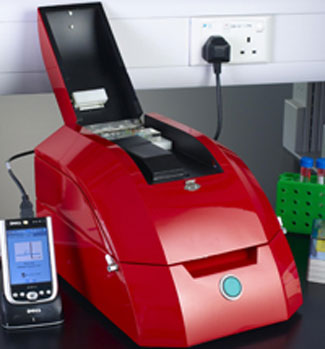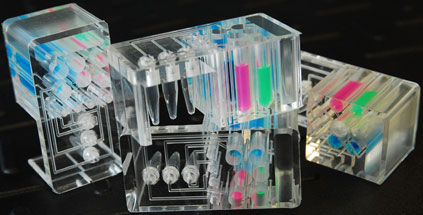| Nov 04, 2011 |
IBN's MicroKit wins silver award at the Asian Innovation Awards 2011
|
|
(Nanowerk News) The Institute of Bioengineering and Nanotechnology (IBN), is pleased to announce that its disease diagnostics technology, the MicroKit, has won the Silver Award at the Asian Innovation Awards 2011 organized by The Wall Street Journal Asia. The result was announced yesterday evening at the awards ceremony held at the Four Seasons Hotel in Hong Kong, which was officiated by Sir John Major, former Prime Minister of the United Kingdom. The Asian Innovation Awards recognize innovations that break with conventional processes in creative ways.
|
 |
| Designed to enable diagnosis outside the laboratory, the MicroKit is portable and easy to use for non-clinical personnel.
|
|
Developed in Singapore by IBN Executive Director, Professor Jackie Y. Ying and her team members, Guolin Xu and James Tseng-Ming Hsieh, the MicroKit is an automated diagnostic device that can detect viruses rapidly and accurately within two hours. Current efforts to contain infectious diseases are often hampered by the time it takes to diagnose and isolate those carrying the virus. Conventional diagnostic tests can take up to half a day and can only be conducted in dedicated biosafety laboratories by clinical personnel, who might risk accidental exposure to the virus.
|
|
Designed to enable diagnosis outside the laboratory, the MicroKit is portable and easy to use for non-clinical personnel. The MicroKit simplifies disease detection by integrating the sample preparation, amplification and detection processes in a disposable polymer cartridge. As everything takes place within the completely sealed cartridge, the risk of potential virus exposure is minimized. This portable device can be used at airports, borders, checkpoints and clinics to help contain the rapid spread of infectious diseases and prevent pandemics.
|
|
"We are delighted to receive the Silver award for the MicroKit. Our device aims to diagnose infectious diseases safely and quickly. Such diagnostic kits really help towards curbing the spread of diseases such as H1N1. This invention is the result of multidisciplinary research and reflects IBN's mission to develop innovative biomedical devices that will improve healthcare and benefit society," said Professor Jackie Y. Ying.
|
|
Now in its 12th year, The Wall Street Journal's Asian Innovation Awards attracted 256 entries from 18 countries and territories in the Asia Pacific region this year. The Asian Innovation Awards is committed to finding the next big technological ideas in Asia. This year's entries have been shortlisted based on three criteria: level of creativity or degree of innovation, quality of execution, and potential impact on quality of life or productivity. The awards were open to individuals, small businesses, large corporations or academia in Asia Pacific. IBN's MicroKit was one of the 12 finalists selected, and one of 5 finalists from Singapore. Please refer to the Annex for information on the judging panel for the awards.
|
 |
| The MicroKit simplifies disease detection by integrating the sample preparation, amplification and detection processes in a disposable polymer cartridge.
|
|
IBN licensed the MicroKit technology to SG Molecular Diagnostics Pte Ltd in January 2009 to develop a range of diagnostic devices. The Institute is also working on the next-generation MicroKit, which will process 20 samples for 25 different diseases simultaneously.
|
|
About the Institute of Bioengineering and Nanotechnology
|
|
The Institute of Bioengineering and Nanotechnology (IBN) was established in 2003 and is spearheaded by its Executive Director, Professor Jackie Yi-Ru Ying, who was a Professor of Chemical Engineering at the Massachusetts Institute of Technology (1992 - 2005).
|
|
In 2008, Professor Ying was recognized as one of "One Hundred Engineers of the Modern Era" by the American Institute of Chemical Engineers for her groundbreaking work on nanostructured systems, nanoporous materials and host matrices for quantum dots and wires.
|
|
Under her direction, IBN conducts research at the cutting-edge of bioengineering and nanotechnology. Its programs are geared towards linking multiple disciplines across engineering, science and medicine to produce research breakthroughs that will improve healthcare and our quality of life.
|
|
IBN's research activities are focused in the following areas:
|
|
Drug and Gene Delivery, where the controlled release of therapeutics involve the use of functionalized polymers, hydrogels and biologics for targeting diseased cells and organs, and for responding to specific biological stimuli.
Cell and Tissue Engineering, where biomimicking materials, stem cell technology, microfluidic systems and bioimaging tools are combined to develop novel approaches to regenerative medicine and artificial organs.
Biodevices and Diagnostics, which involve nanotechnology and microfabricated platforms for high-throughput biomarker and drug screening, automated biologics synthesis, and rapid disease diagnosis.
Pharmaceuticals Synthesis and Green Chemistry, which encompasses the efficient catalytic synthesis of chiral pharmaceuticals, and new nanocomposite materials for sustainable technology and alternative energy generation.
|
|
IBN's innovative research is aimed at creating new knowledge and intellectual properties in the emerging fields of bioengineering and nanotechnology to attract top-notch researchers and business partners to Singapore. Since 2003, IBN researchers have published over 710 papers in leading journals.
|
|
IBN also plays an active role in technology transfer and spinning off companies, linking the research institute and industrial partners to other global institutions. The Institute has a portfolio of over 744 patents/patent applications on its inventions, and welcomes industrial and clinical partners to collaborate on and co-develop its technologies. IBN has successfully commercialized 33 patents/patent applications.
|
|
IBN's current staff and students strength stands at over 160 scientists, engineers and medical doctors. With its multinational and multidisciplinary research staff, the institute is geared towards generating new biomaterials, devices, systems and processes to boost Singapore's economy in the medical technology, pharmaceuticals, chemicals, consumer products and clean technology sectors.
|
|
IBN is also committed to nurturing young talents. Besides the training of PhD students, IBN has a Youth Research Program (YRP) for students and teachers from secondary schools, junior colleges, polytechnics, and universities. Since its inception in October 2003, IBN's YRP has reached out to more than 48,000 students and teachers from 274 local and overseas schools and institutions. Over 1,400 students and teachers have completed research attachments at IBN for a minimum period of four weeks.
|


